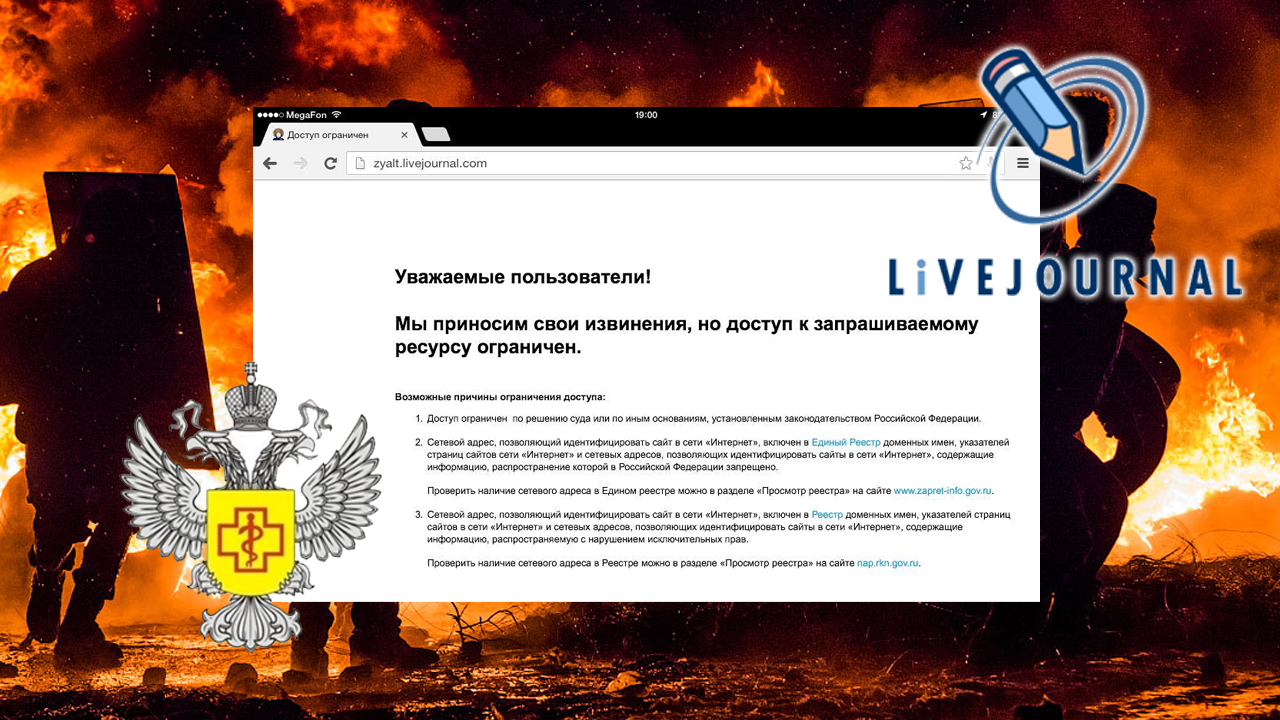Four domains were blocked by Russian ISPs this weekend, including LiveJournal.com. According to new amendments signed into law by President Putin on January 30th and enacted on February 1st, access to websites can be temporarily blocked for any singular reported post containing “extremist information threatening society and individuals” under the orders of Rospotrebnadzor, Russia’s Federal Service for Supervision of Consumer Rights Protection and Human Well-Being.
LiveJournal is a mostly Russia-based online blog community which hosts personal diaries, but it’s been sometimes known as a sort of independent and citizen journalism and political commentary hub, in a time when Russia’s mainstream media is almost exclusively controlled by the government. Independent photojournalist Ilya Varlamov — whose LiveJournal account provided regular excellent coverage of Ukrainian protest clashes, violent beatings of peaceful gay rights protestors in Moscow and more — posted the block notice he received after he unsuccessfully attempted to access his page this weekend.
Rospotrebnadzor commands that…
…All sites that publish calls for riots (“group disorder”), extremist activities and participation in public events held in violation of the established order are subjected to pre-trail blocking.
In the current version of the law, any social media website domain can be blocked from local Russian ISPs if a post is reported to contain illegal information, without trial.
However, this particular situation was corrected within hours. LiveJournal was notified that it was “on review,” so the website owners immediately deleted the offensive posting — discussed by some to have been White Power rantings of mentally disturbed individual, but not confirmed — and the domain was taken off the blocked list.
While there are many undemocratic elements to these procedures, ripe for timely villainous Putin narratives, some of them are technological limitations. Russian ISPs can’t block specific pages or filter types of content, but they can make domains inaccessible, which they do when a specific URL on that domain is reported to contain “illegal information.” They can only flip off the switch on a domain or IP, but full access to the site can be restored, after full and speedy corroboration from the domain owners.
In the prior version of this law, only sites hosting child pornography, instructions for making and consuming illegal drugs and promotion of suicide could be blocked. This has already happened with VKontakte (Russian Facebook), Wikipedia, YouTube and Facebook. ANIMAL previously reported on the temporary blocking of Facebook over some ads for synthetic (fake) weed and the brief blocking SquareSpace, allegedly over some risque satirical gay-themed art-PDFs.
It’s also important to note that LiveJournal’s Terms of Service already prohibit offensive and hatred-inciting content. So in a sense, on the surface, Russia’s Rospotrebnadzor was simply asking LiveJournal to enforce those terms — and their terms — by blocking the domain until they corroborate within the set time-frame, under the threat of being permanently blacklisted.
The new “anti-extremism” internet censorship amendment brings up fresh concerns, particularly the wording that authorizes Rospotrebnadzor to block without trial any site containing a post calling for “participation in public events held in violation of the established order.”
The Russian government took some heavy anti-protesting measures recently, with Gay Pride protests made illegal for the next 100 years, brutal anti-protest police violence going unpunished, the exponentially increasing fines and arrests for any protest action “unsanctioned” by the government (read: any protest action) and excessive punishments of activists (pre- and post-Pussy Riot). That’s not to mention the “Bolotnaya Prisoners” who were randomly grabbed out of the crowds and detained at anti-Putin protests and, despite Putin’s “amnesty” to a select few, many are still facing more months of daily trial and years in jail for minor offenses like yelling aka “inciting mass riots” or “attacking” a riot cop and causing him “intolerable pain” by chucking a lemon at his armor.
Despite those 100,000-people protests back in the post-Putin re-election days, all these legal developments and demonstrative, gregarious punishments — along with the splintering of opposition, whose unity was somewhat illusionary in the first place — effectively crushed the street protest movement in Russia. In full scope of events, the LiveJournal incident is rather minor. But the implications aren’t. With properly villainous timing, the new internet censorship law amendment could be used to temporarily block mobilized social media, impede what is left of protest action and degrade public political opposition even further.
It’s paranoid to think this was definitely the point of the amendment. It’s naive to think that it definitely wasn’t.


